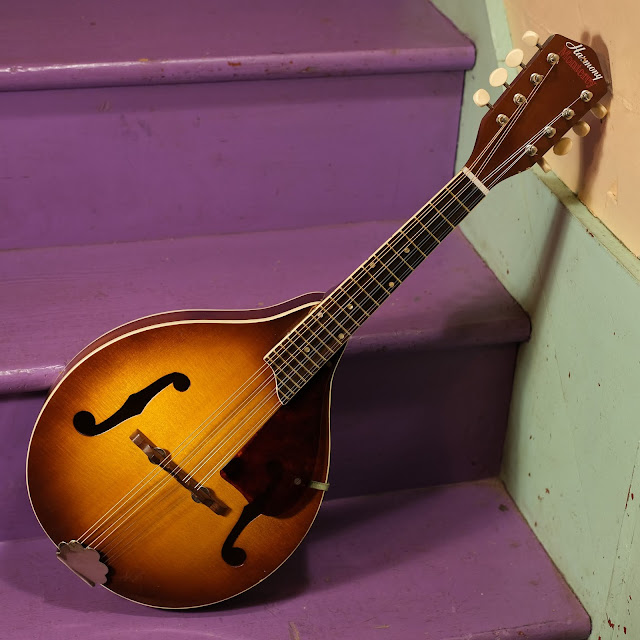1971 Harmony H417 Monterey Archtop Mandolin
Harmony built archtop mandolins of this style from the '30s right up until the company dissolved its American-made self in the mid-'70s. This one dates to '71 per its stamp inside. These latter-era Monterey mandos are actually a little nicer than some of the earlier ones. They sport solid spruce tops over solid maple back and sides. They're pressed-tops, though, and not carved -- so they tend towards a bit more of a boxy/choppy sound than woody. Nevertheless, they really do sound pretty good. They're a bit like a Gibson A-50 or '40s solid-top Strad-O-Lin, but not as loud as either and not as nuanced as a Gibson.
Unfortunately, they almost always need neck resets. This one did. It's owned by the grandson of the original owner and I think he's going to be very happy to get it back in a playable state. It had cheese-slicer action before but now it's playing quick and on-the-dot post-repairs.
One interesting note on these: they have the old-style Waverly baseplates which usually mount 10:1 or 12:1 tuners but these versions are actually modern-ratio 18:1 in functionality. I wish that more American makers had used these in the '60s/'70s for their mandos.
Repairs included: neck reset, fret level/dress, bridge alterations, setup.
Made by: Harmony
Model: H417
Made in: Chicago, IL, USA
Top wood: solid spruce
Back & sides wood: solid maple
Bracing type: tonebar
Bridge: rosewood
Fretboard: rosewood
Neck wood: maple
Tone: direct, midsy, choppy
Suitable for: folk, country, bluegrass, old time
Action height at 12th fret: hair under1/16” overall (fast, spot-on)
String gauges: 36w-10
Neck shape: medium C
Board radius: flat
Truss rod: non-adjustable
Neck relief: straight
Fret style: medium-small
Scale length: 13 15/16"
Nut width: 1 3/16"
Body length: 12 3/4"
Body width: 10"
Body depth: 1 7/8" +arching
Condition notes: fairy clean throughout but a bit of finish muck-up/chipping near the neck joint -- it was there when it arrived. It's all-original, too, though I lightly-altered the bridge base to increase adjustment room and stability. There's a screwhole in the top of the headstock from where someone had attached a strap in the past.











Comments